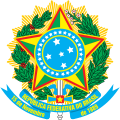You can help expand this article with text translated from the corresponding article in Portuguese. (December 2019)Click [show] for important translation instructions.
|
| This article is part of a series on the |
| Politics of Brazil |
|---|
 |
Condução coercitiva [a] is a Brazilian judicial mandate or summons, which provides for a compulsory method of bringing subjects of a judicial process, victims, witnesses, accused parties, or expert subjects into the presence of law enforcement or judicial authorities against their wishes. This is a measure provided for in the Penal Code of Brazil (CPP) as a means of compelling the appearance of a person to attend an action to which he was summoned, but who failed to do so without justification. [1]
Contents
According to some jurists, this is a form of short-term "precautionary detention" (prisão cautelar) whose purpose is to ensure the convenience of the production of proof. [2] If equated with precautionary detention, condução coercitiva is contrary to the Brazilian Constitution of 1988 Article 5, paragraph LXI, even though the procedure is in the Penal Code of Brazil, instituted in 1941. [3]
The CPP authorizes the enforcement of the condução coercitiva of victims, witnesses, defendants, and experts who refuse to appear in court, and who may even be handcuffed and brought by police vehicle. Article 218 of the CPP refers to the requirement of prior summons (Portuguese : intimação ). Thus, some argue that even with the justification of providing clarification to the police investigation and even in the interests of justice, the condução coercitiva warrant without a summons violates the right to liberty of witnesses and defendants. According to this line of thinking, the only ones who can be compelled to appear by a condução coercitiva are those witnesses who were appropriately summoned beforehand and who fail to attend the act to which they were summoned, without valid cause, may be compelled to appear via a condução coercitiva warrant.
There is some controversy concerning the exact legal foundation and even constitutionality of the condução coercitiva warrant. From a legal perspective, it is not the same as an arrest warrant. [4]
